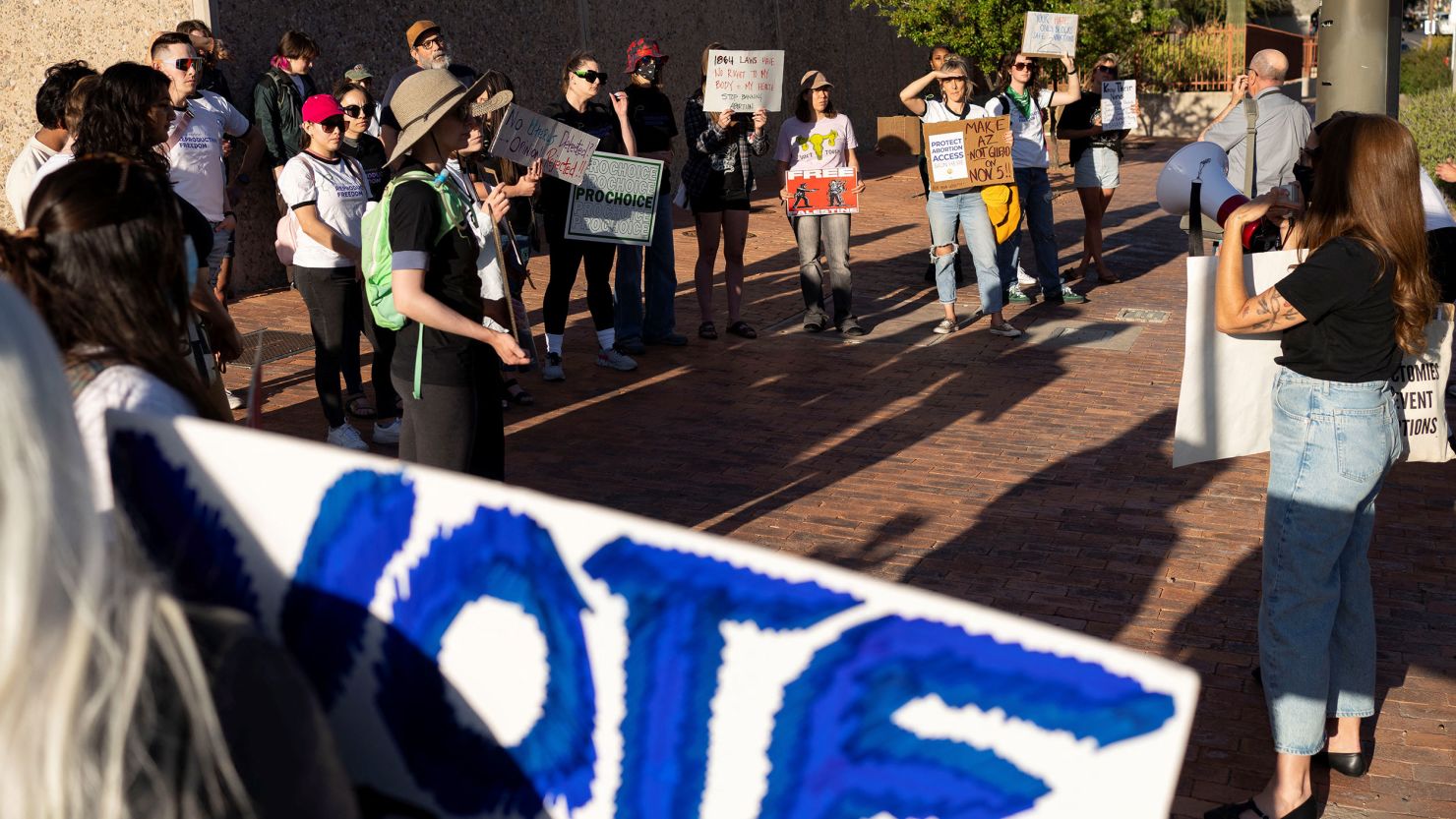Abortion politics have been thrust into the spotlight in Arizona, where the state Supreme Court’s decision this week to revive a Civil War-era total abortion ban has sent Republicans scrambling to distance themselves and given Democrats new hope they can make gains in the battleground state.
The court’s long-awaited ruling has exponentially raised the stakes in elections up and down the ballot, as Democrats and allied groups work to tie GOP candidates to their past comments on abortion and the states’ rights position embraced by their party’s leader, former President Donald Trump.
Arizona voters will have an outsized impact on the general election, when they could help determine who the president is and what the balance of power will be in the House and Senate. They’ll also have a chance to vote directly on the abortion ban the court has revived – abortion rights groups are currently in the signature gathering process, which has gained a new level of urgency.
“This is a huge political earthquake in Arizona,” said Barrett Marson, an Arizona GOP political consultant. “It’s turned every competitive race into a single issue campaign.”
The ruling came one day after Trump said that whatever states decide “must be the law of the land.” But by Wednesday, when asked if Arizona’s supreme court had gone too far, the former president said it did.
“That’ll be straightened out and as you know it’s all about states’ rights, that’ll be straightened out and I’m sure the governor and everyone else are going to bring it back into reason and that will be taken care of, I think very quickly,” Trump said on the tarmac of the Hartsfield-Jackson Atlanta International Airport.
He added that he would not sign a federal abortion ban if one was passed through Congress.
Republicans in other competitive races quickly came out against the decision and called on the state’s GOP legislature to pass legislation addressing the issue. Rep. Juan Ciscomani, who is running for reelection in one of the most competitive districts in the country, called the ruling “disaster for women and providers.”
Kari Lake, who is running for Senate against Democratic Rep. Ruben Gallego, said she opposed the ruling and called on the state legislature and Democratic Gov. Katie Hobbs to “come up with an immediate common sense solution that Arizonans can support.” She also said she’s opposed to a federal abortion ban.
Gallego criticized Lake over her past support for the law and promised to “whatever it takes to protect abortion rights at the federal level” if he wins in November.
“Our fight against extremist bans like the one enacted today has never been more important,” he said in a statement, adding: “Here in Arizona, we support a woman’s right to an abortion — which is why I am going to defeat Kari Lake and fight like hell to protect abortion rights once and for all.”
The state’s total ban traces its roots back to 1864, when Arizona was a territory, and was codified in 1901. It remained in effect until 1973, when it was blocked by a court injunction after Roe v. Wade was decided, creating a federal constitutional right to an abortion.
Decades later, then-Gov. Doug Ducey, a Republican, signed a 15-week abortion limit, with no exceptions for rape or incest, into law in March 2022. The law explicitly stated that it did not overrule the 1864 ban. It snapped into effect after Roe was overturned that summer.
Then, in September 2022, an Arizona judge ruled that the 19th century old total ban could be enforced. Weeks later, an appeals court blocked it.
That initial legal battle played out in the final months of the 2022 midterm elections, when Lake narrowly lost her bid for governor to Hobbs. Lake had called the 1864 law “great” and said she would support whatever the court interpreted the law as, while Hobbs explicitly campaigned against the total ban.
Democrats in Arizona and across the country credited their focus on abortion rights with staving off an expected red wave during the 2022 midterm elections. Since then, abortion rights have proven to be a driving issue nationwide. Arizona is one of nearly a dozen states that could have an abortion rights measures on the November ballot.
Republicans’ forceful rejections show abortion remains a difficult issue for their party, which has embraced the overturning of Roe v. Wade but tried to avoid the electoral backlash to draconian abortion laws.
“The voters are not going to fooled by their turn about on this issue,” said Stacy Pearson, an Arizona-based Democratic strategist. “This is going according to plan – it’s just not going to be helpful for them in November.”
Up to the states
The ruling could have the biggest impact in the presidential race, with Joe Biden and Donald Trump set for a rematch this fall. In 2020, when Biden beat Trump in the state by fewer than 11,000 votes, Biden won 93% of voters who said abortion should be legal in all cases and 63% of those said it should be legal in most case, according to CNN exit poll data. Combined, those groups made up 53% of voters.
Trump won 76% of people who said it should be illegal in all cases and 80% who said it should be illegal in most cases, but those voters made up 40% of voters.
The Arizona abortion ban news came one day after Trump released a statement in support of letting states decide their abortion laws, ending speculation that he’d back a national 15-week ban. His campaign reiterated his stance after the ruling.
The Biden campaign announced Tuesday that Vice President Kamala Harris will attend a “reproductive freedom” event in Tucson Friday and has stressed the direct connection between Trump’s efforts to appoint judges who would overturn federal abortion protections and this week’s ruling.
“This even more extreme and dangerous ban criminalizes almost all abortion care in the state and puts women’s lives at risk,” Harris said in a statement. “It’s a reality because of Donald Trump, who brags about being ‘proudly the person responsible’ for overturning Roe v. Wade, and made it possible for states to enforce cruel bans.”
Biden offered a shorter pitch to Arizona voters Wednesday afternoon: “Elect me.”
In a statement following the ruling Tuesday, Biden described the ban as “cruel,” “extreme” and “dangerous,” and he pledged that he and Harris will continue to fight for abortion rights.
A November ballot initiative
Within the state, abortion advocates and opponents are focused on the effort to put an initiative on the November ballot to create a right to the procedure before fetal viability, which doctors believe to be around 22 to 24 weeks of pregnancy.
“Arizonans are going to be able to weigh in on this and enshrine abortion in our state’s constitution in November and I am confident that when given the opportunity, they will vote to protect abortion access,” Hobbs told CNN’s Anderson Cooper.
Marjorie Dannenfelser, the president of SBA Pro-Life America, called the amendment an “extreme measure” that must be defeated and praised the ruling reviving the state’s total abortion ban as “a major advancement in the fight for life in Arizona.”
Since last September, Arizona for Abortion Access has been organizing to pass a ballot initiative to enshrine abortion access into the state’s constitution. The campaign needs to submit at least 384,000 valid signatures by July 3 to get the proposal placed on the November ballot. So far, organizers say they have 500,000, and hope to double that number by the deadline as insurance against likely legal challenges from abortion opponents.
“We’ve been talking about what the stakes are repeatedly since day one,” said Chris Love, a spokesperson for Arizona for Abortion Access. “I think [the ruling] is an unfortunate and devastating example of all of the things that we’ve said about why it’s important to enshrine the right to abortion in our state constitution.”
CNN’s Kate Sullivan, Ebony Davis and Ali Main contributed to this report.


